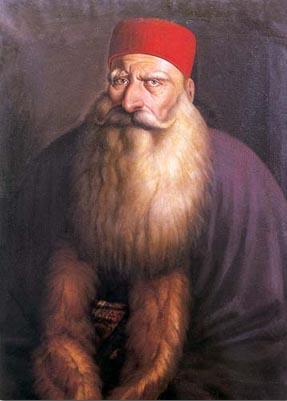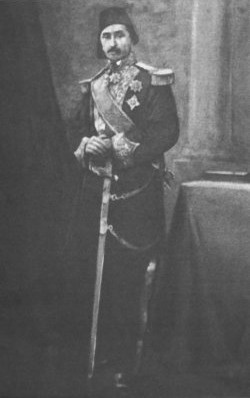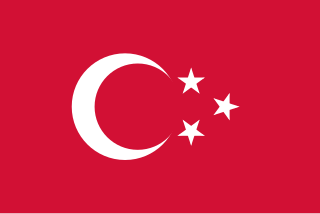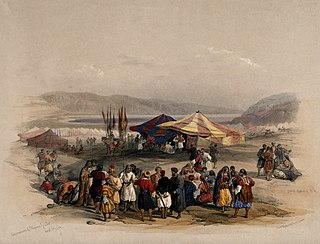Related Research Articles

The Damascus affair of 1840 refers to the arrest of several notable members of the Jewish community in Damascus on the accusation of murdering Father Thomas, a Christian monk, and his Muslim servant for the purpose of using their blood to bake matzo, an antisemitic accusation also known as the blood libel.
The history of Egypt under the Muhammad Ali dynasty (1805–1953) spanned the later period of Ottoman Egypt, the Khedivate of Egypt under British occupation, and the nominally independent Sultanate of Egypt and Kingdom of Egypt, ending with the Revolution of 1952 and the formation of the Republic of Egypt.
Mohamed Sherif Pasha GCSI (1826–1887) was an Egyptian statesman. He served as Prime Minister of Egypt three times during his career. His first term was between April 7, 1879 and August 18, 1879. His second term was served from September 14, 1881 to February 4, 1882. His final term was served between August 21, 1882 and January 7, 1884.

Mustafa Fazıl Pasha was an Ottoman-Egyptian prince of ethnic Albanian descent belonging to the Muhammad Ali Dynasty founded by his grandfather Muhammad Ali Pasha.

Ottoman Egypt was an administrative division of the Ottoman Empire after the conquest of Mamluk Egypt by the Ottomans in 1517. The Ottomans administered Egypt as a province (eyalet) of their empire. It remained formally an Ottoman province until 1914, though in practice it became increasingly autonomous during the 19th century and was under de facto British control from 1882.

Bashir Shihab II was a Lebanese emir who ruled the Emirate of Mount Lebanon in the first half of the 19th century. Born to a branch of the Shihab family which had converted from Sunni Islam, the religion of previous Shihabi emirs, he was the only Maronite ruler of the Mount Lebanon Emirate.

The First Egyptian–Ottoman War or First Syrian War (1831–1833) was a military conflict between the Ottoman Empire and Egypt brought about by Muhammad Ali Pasha's demand to the Sublime Porte for control of Greater Syria, as reward for aiding the Sultan during the Greek War of Independence. As a result, Egyptian forces temporarily gained control of Syria, advancing as far north as Kütahya.

Ali Pasha Mohamed Sherif was an Albanian-Egyptian government official and a renowned breeder of Arabian horses during the late 19th century.

The Khedivate of Egypt was an autonomous tributary state of the Ottoman Empire, established and ruled by the Muhammad Ali Dynasty following the defeat and expulsion of Napoleon Bonaparte's forces which brought an end to the short-lived French occupation of Lower Egypt. The Khedivate of Egypt had also expanded to control present-day Sudan, South Sudan, Eritrea, Djibouti, northwestern Somalia, northeastern Ethiopia, Lebanon, Jordan, Syria, Greece, Cyprus, southern and central Turkey, in addition to parts from Libya, Chad, Central African Republic, Democratic Republic of Congo, and Uganda, as well as northwestern Saudi Arabia, parts of Yemen and the Kingdom of Hejaz.

Khalil Sherif Pasha, transliterated variously as Halil Şerif Pasha, was an Ottoman-Egyptian statesman, diplomat and art collector, who lived during the Tanzimat period. His collection was described by Théophile Gautier as "the first ever to be formed by a child of Islam". He was furthermore involved in diplomatic affairs following the aftermath of the Crimean War. He also served as the Ottoman Minister of Foreign Affairs.

Ahmad Agha Fadhelaldin Agha Al-Asali Duzdar was mayor of Jerusalem and Governor of Jerusalem from 1838 to as late as 1863.

Abbas Helmy I of Egypt was the Wāli of Egypt and Sudan. He was a son of Tusun Pasha, the younger son of Muhammad Ali Pasha whom he succeeded as ruler of Egypt and Sudan. The Chambers Biographical Dictionary says of him: "[b]igoted and sensual, he did much to undo the progress made under Muhammad Ali."

Nazli Zainab Hanim was an Egyptian princess from the dynasty of Muhammad Ali Pasha and one of the first women to revive the tradition of the literary salon in the Arab world, at her palace in Cairo from the 1880s until her death.

Soliman Pasha al-Faransawi, born Joseph Anthelme Sève, was a French-born Egyptian commander.

Muhammad Ali was the Ottoman Albanian governor and de facto ruler of Egypt from 1805 to 1848, considered the founder of modern Egypt. At the height of his rule, he controlled Egypt, Sudan, Hejaz, Najd, the Levant, Crete and parts of Greece.

Muhammad Abu al-Dhahab, also just called Abu Dhahab was a Mamluk emir and regent of Ottoman Egypt.
Tahir Pasha Pojani or Tahir Pasha born in Kavala as the son of Ahmed Bey from Pojan and Zohra Khanum, oldest sister to Muhammad Ali Pasha. His Siblings was Ismail, Huseyin and Gülsün who was married with Mehmet Sabit Pasha. His son was Ahmed Tahir Pasha Pojani b. in Kavala, who was married with Hatice Khanum b.in Alexandria a daughter of Nawab Mirza Shahmir Khan Bahadur of Oudh. He was the Albanian commander of bashi-bazouks under Koca Hüsrev Mehmed Pasha. He rebelled and assumed government of Cairo, becoming the acting Ottoman governor of Egypt on 6 May 1803. He was beheaded by a Janissary soldier within a month of acting as governor when he was unable to pay the troops their outstanding pay.
ʿAlī Ḥaydar Pāshā ibn Jābir was an Ottoman politician who served as Emir and Grand Sharif of Mecca from 1916 to 1917 during the Arab Revolt and the First World War.
References
- ↑ "Sherif Pasha El- Kebir Family". Genforum.genealogy.com. 2000-05-17. Retrieved 2020-06-09.
- ↑ Tewfik, Mohammed Ali (1935–48). Breeding of Pure Bred Arab Horses. Cairo: Print. Office, Paul Barbey.
- ↑ Excerpt dated August 1840 from Montefiore, Sir Moses; Montefiore, Lady Judith Cohen (1890). Diaries of Sir Moses and Lady Montefiore, Comprising their Life and Work as Recorded in their Diaries from 1812 to 1883.
- ↑ Frankel, Jonathan (1997). The Damascus Affair. Press Syndicate of the University of Cambridge. p. 60. ISBN 9780521483964.
- ↑ Turker, Deniz (June 2007). The Oriental Flaneur: Khalil Bey and the Cosmopolitan Experience (PDF) (Thesis). Masters Thesis, Massachusetts Institute of Technology. p. 16.
- ↑ Cooper, Thomas (1875). Men of the Time: A Dictionary of Contemporaries (9th ed.). G. Routledge and Sons. pp. 609–10.